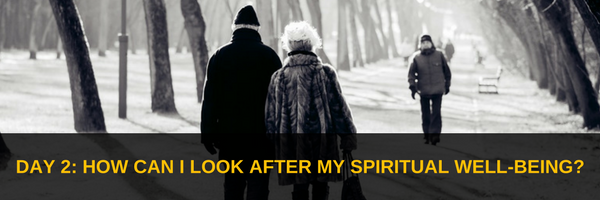
Welcome to day 2. Yesterday’s activity was about becoming more aware of your own spiritual needs and well-being. Today we will explore some of the practical ways that can be useful for coping with the emotional demands of the care workplace.
For many people, looking after their own spiritual needs includes activities that help them to reflect on their day to day experiences. This might be going for a walk, making time to talk to someone you trust or simply taking some time out. For some people, attending services and taking part in rituals relevant to their religious faith provides the place for reflection and renewal. Others like to participate in physical or creative activities outside of work such as swimming or art. All these actions, used regularly, help individuals to build resilience. This means developing the personal skills and habits that help you to cope better on a day to day basis. Attending to your spiritual needs and well-being is an important and personal issue, but it is also challenging where time, space and resources are limited.
Have a listen to today’s Audio Podcast where different care staff talk about the sorts of things they do to help them cope with the demands of their workplace.
Podcast – Practical ways for building resilience
Listen to the podcast before you start today’s activity. It is about 10 minutes long. Choose a time that suits you best. When you are ready to listen click play below.
Play Today’s Audio
Podcast: Play in new window | Download
You can read the transcript if you prefer.
Activity – Coping activities for building resilience
Today we would like you to try out an activity to help your spiritual well-being. You should aim to try something new.
1. Try out one of the following activities:
- Go for a short walk, during a break or at a time and place that suits you.
- Find a quiet place to take a 10-minute time-out on your own.
- Arrange a time to share your experiences and feelings with a trusted person.
- Visit the place where you practice your religious faith.
- Participate in an activity such as swimming, running, singing, dancing, art etc.
2. How well did the activity work?
3. Will you continue to use this activity or will you try something different?
Top Tip – Note down your experiences and your answers to the questions. It is the reflective part of these activities that helps them to work. Either use your notebook or the Course Learning Diary.
Having activities or coping actions will help you to build your day to day resilience for coping with the emotional demands that you experience.

